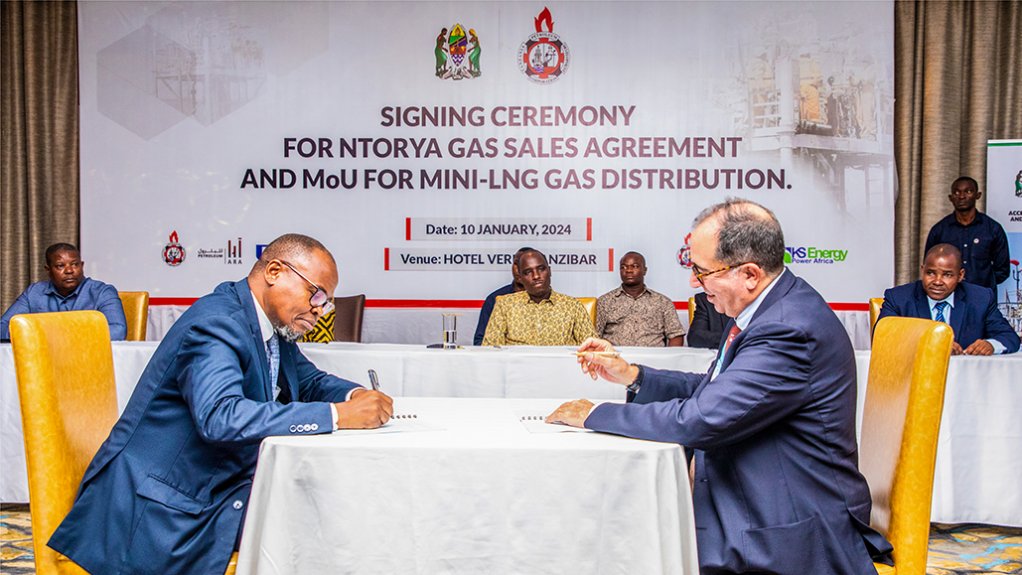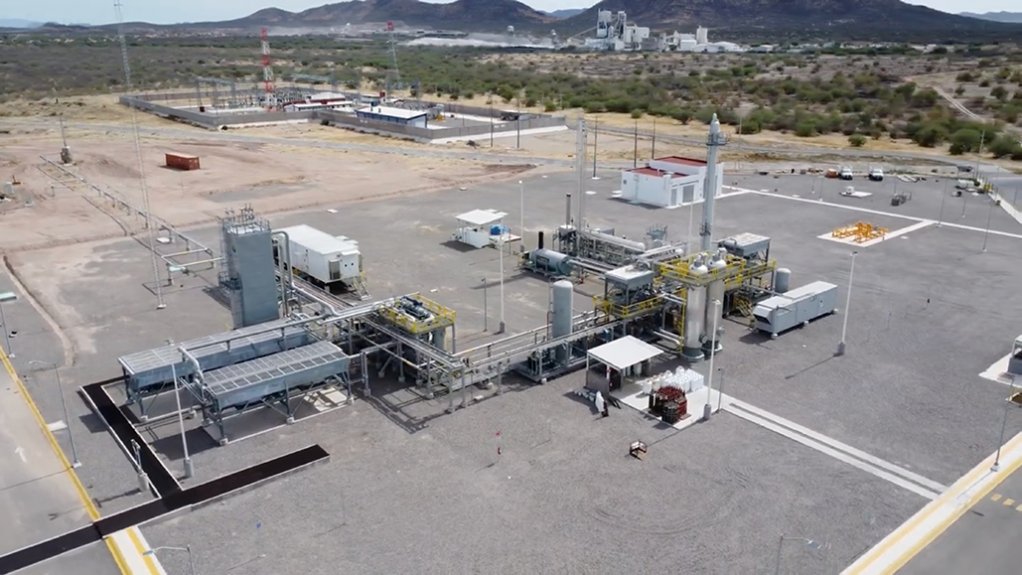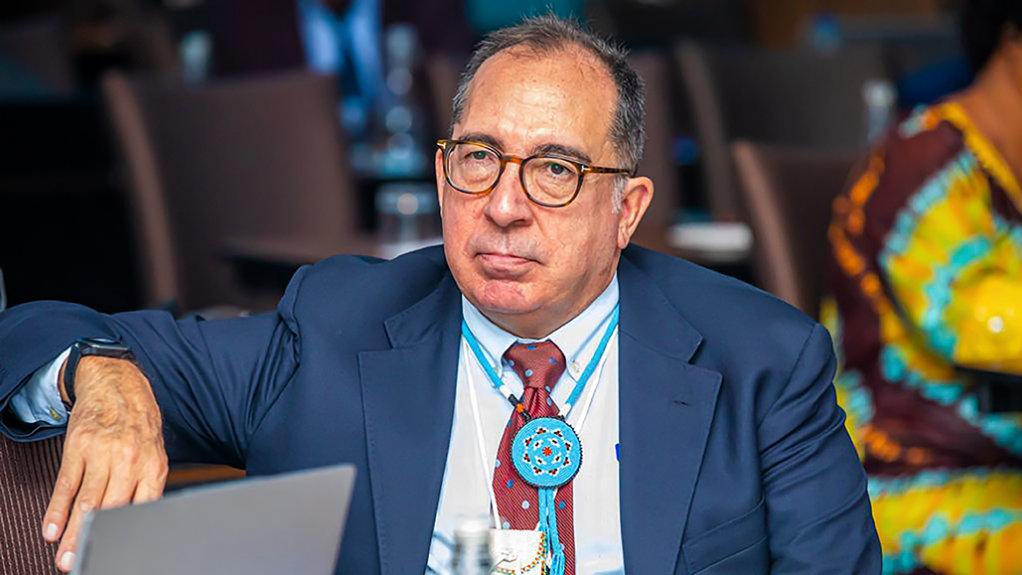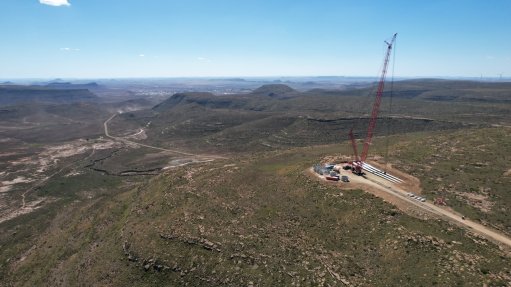Financial closure for $90m small-scale LNG plant in Tanzania imminent




TPDC MD Mussa Makame and KS Energy Group CEO Steve Martin sign the agreement
One of KS Energy's previously deployed small-scale LNG plants
KS Energy Group CEO Steve Martin
Energy solutions company KS Energy is targeting financial closure this year for the first phase of a small-scale liquefied natural gas (LNG) supply chain in partnership with a Tanzanian gas producer, with first gas offtake expected in early 2026.
The capital expenditure for the liquefication plant will be less than $90-million.
On January 10, it was announced that the Tanzanian government, through the State-owned Tanzania Petroleum Development Corporation (TPDC) and in partnership with KS Energy, had entered into an agreement for the construction of a small plant to convert natural gas into LNG.
At the signing, Tanzanian Deputy Prime Minister and Energy Minister Dr Doto Mashaka Biteko said the project would be the first LNG production project in the country and would reduce the country’s reliance on diesel and other more carbon-intensive fuels.
TPDC MD Mussa Makame added that the completion of the project would enable the development of other natural gas activities to be carried out, such as the construction of infrastructure to collect gas from wells and for preliminary cleaning, the provision of water and the construction of a 34 km pipeline to transport natural gas to the processing plant located in Msimbati, Madimba in the Mtwara region.
The small-scale LNG plant being developed by KS Energy will have a capacity of between 17-million and 34-million standard cubic feet a day, and will be strategically situated near existing commercially viable wellheads or pipeline locations.
With a yearly volume ranging between 6.2-billion and 12.4-billion standard cubic feet, this amounts to about 6 PJ/y to 12 PJ/y.
KS Energy Group CEO Steve Martin explained to Engineering News that the LNG would be primarily designated for power generation offtakers in Tanzania and Zanzibar.
In addition, the LNG supply will go to off-pipeline consumers that are not currently connected to the TPDC pipeline.
“We want to help create another fuel in addition to hydro, sun and wind to help Tanzania balance a sustainable grid. We are trying to create a more sustainable and energy-equitable future for Africans. We are not trying to sell LNG. We are selling a more sustainable solution that gets people away from burning firewood to make their breakfast or using diesel in their vehicles,” he explained.
Martin said the use of LNG would help reduce the carbon emissions associated with other types of fuels such as diesel, with carbon emission reductions of up to 30%.
However, to take full advantage of this, downstream energy consumers will need to carry out conversions on their vehicles and generators to allow for a changeover from diesel to LNG.
KS Energy advised that, if this is done on a wide enough scale, reductions in carbon emissions could be as much as 120 000 t/y at the beginning, reaching up to 240 000 t/y once production is at full capacity.
The aim is to use both marine and road transportation routes to deliver LNG to the offtakers, thereby minimising the burden on existing Tanzanian pipeline capacities.
“This is an important project because we don't actually need any of the existing pipeline infrastructure. We want raw wellhead gas coming right out of the ground, and there are a number of wells in Tanzania that do not have the pipeline extended to them yet. So we are going to shorten the time that it takes to get that gas delivered commercially to consumers,” Martin explained.
The small-scale LNG plant distribution will incorporate the building of LNG storage and regasification facilities at various endpoints around the country at factories, mines, resorts and various other commercial facilities.
Primarily, the LNG will be transported to consumers through flatbed trucks, which would carry 58 m3 swap body ISO intermodal containers on board.
Martin explained that there would be a combination of marine and road transportation from the gas source, and that these routes had already been assessed and completed in 2017 by a reputable third-party route survey specialist.
Updated route survey reports were issued as recently as last year.
Some of the LNG will also be delivered to a proposed hybrid 140 MW combined cycle power plant plus a 70 MW solar photovoltaic project in Dodoma, Tanzania.
The LNG will be delivered by truck to off-pipeline consumers along the coast, as well as in Arusha, Tanga, Morogoro, Dodoma, Shinyanga, Mwanza, Geita, Kilimanjaro, Songwe, Mbeya and other potential sites.
Martin noted that the flatbed trucks would be procured to allow them to use LNG as the main fuel source.
He said this would help reduce the carbon footprint and cost of transporting the fuel, improving the sustainability of the distribution network. He said that transportation through LNG-fuelled trucks would be more sustainable compared to the existing diesel truck supply chain.
In this regard, KS Energy has estimated that using LNG fuel trucks can reduce the fuel cost per kilometre, fleet-wide, over asset lifecycle, by up to 55% and reduce carbon emissions by as much as 25%.
Martin explained that a portion of the remaining capacity of LNG produced was under consideration for offtakers in neighbouring Southern African Development Community countries, such as the Democratic Republic of Congo, Zambia, Zimbabwe, Malawi and Botswana, where independent power producer projects are under way.
KS Energy is currently engaged in a fuel switch at a 90 MW dual-fuel power plant in Botswana.
This plant currently runs on diesel and was developed in 2008 by KS Energy and is still in operation for the Botswana Power Corporation.
Comments
Press Office
Announcements
What's On
Subscribe to improve your user experience...
Option 1 (equivalent of R125 a month):
Receive a weekly copy of Creamer Media's Engineering News & Mining Weekly magazine
(print copy for those in South Africa and e-magazine for those outside of South Africa)
Receive daily email newsletters
Access to full search results
Access archive of magazine back copies
Access to Projects in Progress
Access to ONE Research Report of your choice in PDF format
Option 2 (equivalent of R375 a month):
All benefits from Option 1
PLUS
Access to Creamer Media's Research Channel Africa for ALL Research Reports, in PDF format, on various industrial and mining sectors
including Electricity; Water; Energy Transition; Hydrogen; Roads, Rail and Ports; Coal; Gold; Platinum; Battery Metals; etc.
Already a subscriber?
Forgotten your password?
Receive weekly copy of Creamer Media's Engineering News & Mining Weekly magazine (print copy for those in South Africa and e-magazine for those outside of South Africa)
➕
Recieve daily email newsletters
➕
Access to full search results
➕
Access archive of magazine back copies
➕
Access to Projects in Progress
➕
Access to ONE Research Report of your choice in PDF format
RESEARCH CHANNEL AFRICA
R4500 (equivalent of R375 a month)
SUBSCRIBEAll benefits from Option 1
➕
Access to Creamer Media's Research Channel Africa for ALL Research Reports on various industrial and mining sectors, in PDF format, including on:
Electricity
➕
Water
➕
Energy Transition
➕
Hydrogen
➕
Roads, Rail and Ports
➕
Coal
➕
Gold
➕
Platinum
➕
Battery Metals
➕
etc.
Receive all benefits from Option 1 or Option 2 delivered to numerous people at your company
➕
Multiple User names and Passwords for simultaneous log-ins
➕
Intranet integration access to all in your organisation





















